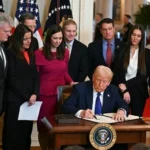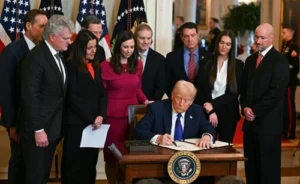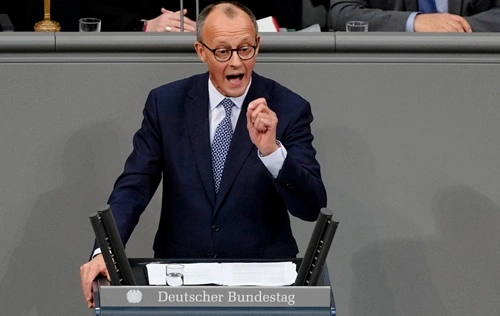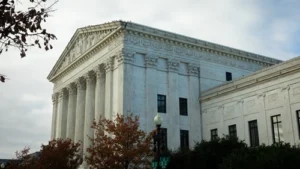Florida Governor Ron DeSantis is aligning his state’s immigration policies with former President Donald Trump’s proposed federal overhaul, signaling a unified Republican front on one of the most contentious issues in U.S. politics. The move, seen as part of DeSantis’ broader national aspirations, underscores his intent to implement stricter immigration measures while reinforcing his political alignment with Trump’s base.
DeSantis announced the alignment in a statement emphasizing Florida’s commitment to enforcing border security and curbing illegal immigration. The governor’s push mirrors Trump’s recently unveiled immigration agenda, which calls for sweeping changes to asylum laws, border security measures, and enforcement policies.
Florida’s Tough Immigration Stance
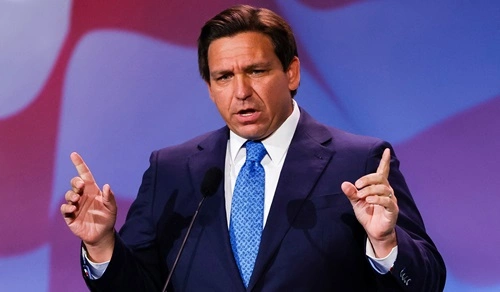
Under DeSantis, Florida has already enacted some of the nation’s toughest immigration laws. In May 2023, the state passed legislation imposing severe penalties on businesses that hire undocumented workers and allocating funds for relocating migrants to Democratic-led states. The latest alignment with Trump’s policies reinforces Florida’s position as a testing ground for conservative immigration strategies.
Key features of Florida’s immigration measures include:
- Enhanced E-Verify Requirements: Businesses must verify the legal status of their employees, with significant penalties for non-compliance.
- Sanctuary City Ban: Local governments are prohibited from enacting policies that limit cooperation with federal immigration authorities.
- Funding for Migrant Relocation: The controversial use of state funds to transport migrants to other states, a policy criticized as political theater, has become a hallmark of DeSantis’ immigration strategy.
DeSantis has defended these measures as essential to maintaining law and order, stating, “Florida will not stand by while the federal government fails to secure our borders. We are taking decisive action to protect Floridians from the consequences of illegal immigration.”
Alignment with Trump’s Agenda
The alignment with Trump’s policies reflects DeSantis’ effort to court the former president’s loyal base, a critical constituency in the Republican Party. Trump’s immigration overhaul includes:
- Ending Birthright Citizenship: Trump has vowed to end the automatic granting of U.S. citizenship to children of undocumented immigrants born on U.S. soil.
- Stricter Asylum Rules: Plans to limit asylum eligibility and expedite deportations for those who enter illegally.
- Restoring Border Wall Construction: Resuming the construction of a wall along the U.S.-Mexico border, a centerpiece of Trump’s previous administration.
- Increased Immigration Enforcement: Deploying more resources to track, detain, and deport undocumented individuals.
By aligning Florida’s policies with this federal vision, DeSantis is solidifying his credentials as a staunch immigration hardliner while echoing Trump’s rhetoric on protecting American jobs, resources, and safety.
Political Implications
DeSantis’ move comes at a pivotal time as the 2024 Republican primary season heats up. While Trump remains the frontrunner in most polls, DeSantis is seen as his closest rival. By adopting similar immigration policies, DeSantis is signaling unity with the former president while distinguishing Florida as a state where conservative policies are enacted swiftly and decisively.
The strategy could also help DeSantis appeal to voters who prioritize immigration reform as a top issue. However, critics argue that this approach risks alienating moderate and independent voters, who may view such policies as extreme or inhumane.
Opposition and Backlash
Democrats and immigrant advocacy groups have sharply criticized the alignment, arguing that it exacerbates the challenges faced by migrants and undermines the values of inclusivity and compassion. Critics have also questioned the legality and morality of policies such as migrant relocations and denying services to undocumented individuals.
“Instead of addressing the root causes of migration or offering comprehensive reform, these measures fuel division and harm vulnerable communities,” said a spokesperson for the American Civil Liberties Union (ACLU).
Broader Implications
The alignment between Florida and Trump’s federal agenda raises questions about the future of immigration policy in the U.S. Should Trump or a similarly aligned candidate win the presidency in 2024, Florida’s policies could serve as a blueprint for national reforms. Conversely, the divisiveness of these measures could deepen partisan divides on immigration.
Conclusion
Ron DeSantis’ decision to align Florida’s immigration policies with Trump’s federal agenda underscores his commitment to conservative governance and his positioning as a national Republican leader. While the move strengthens his appeal to the Republican base, it also amplifies the contentious debate surrounding immigration in America. As the 2024 elections approach, this alignment sets the stage for a broader national conversation on immigration policy, its impacts, and the direction the country will take on this critical issue.



